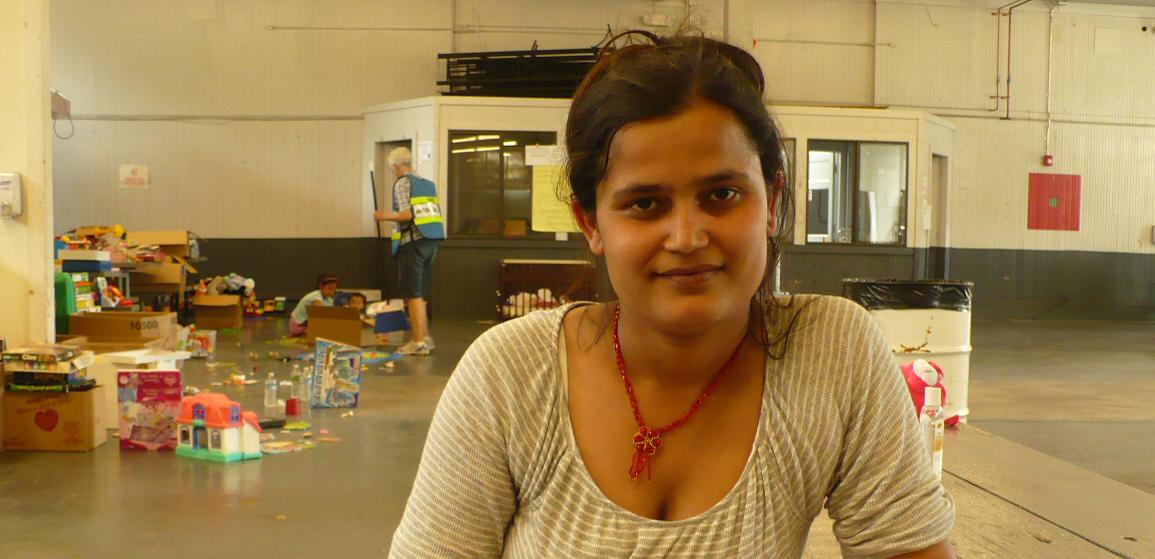Iraq, Nepal and Senegal Refugees Now Faced With Damage From Massachusetts’ Tornadoes
Pabitra Sanyasi, a Bhutanese refugee from Nepal living in Massachusetts (photo: Jill Kaufman)
By Jill Kaufman
When tornadoes hit central and western Massachusetts in early June, three people were killed and hundreds of others lost their homes. Several weeks later, some are still living in emergency shelters. In West Springfield, many of the displaced have been displaced before. They’re refugees from places like Somalia, Iraq, and Nepal.
Standing outside a dormitory near where she and her husband to live, Pabitra Sanyasi holds her one year old daughter. Her son runs around her legs. Her family is ethnic Bhutanese.
They were refugees in Nepal for 18 years. In 2007, the US government agreed to resettle about 60,000 Bhutanese who’d been exiled by their own government. Sanyasi and her family came here two years ago. Her daughter Jenny, who wiggles to be put down, was born in Massachusetts. She turned one on June 1, the day of the tornado. Sanyasi said that the tornado knocked down a tree in front of their home.
“The tree was broken and parts of the tree are in our house,” she said. “¨
Sanyasi’s rented apartment is now uninhabitable. It was on the second floor of a multi-family home. She said she was lucky she was visiting her mother and father who live on the first floor when the storm struck. If she and her kids had been upstairs, they would have been crushed.
Like many whose lives were upended by the tornado, Sanyasi is waiting to find out about federal and state assistance. For now, she is grateful her family is safe and that they have a place to sleep.
“It is clean,” she said. But there are other issues. “¨”We don’t like American food,” Sanyasi said. “We used to eat Indian food. Our neighbors bring food for us.” “¨
So dozens of pancakes brought into the shelter this morning for breakfast were barely touched. Volunteers looked into retro fitting a coffee maker into a rice cooker.
This shelter, run by the town of West Springfield, depends on dozens of volunteers. One of the agencies coordinating the search for new housing is Lutheran Social Services. Mohammed Najeeb, an Iraqi immigrant who works for the agency, has been trying to help the displaced families sort out the most recent place they call home.
“It is very frustrating for them,” Najeeb said. “They don’t know what they’re doing or what they’re going to do or what their future plans are. That’s when we step in and try to figure out a long-term solution for them because now they’re in a shelter and they don’t know what to do.”
Najeeb’s regular job is to coordinate the relocation of refugees to the area, helping them find homes, clothes, work, and English lessons. Now, for some of his clients, he has to start all over again.
“I hear their exact words — ‘why does this keep happening to me?'” he said. “¨
For the second time, Najeeb has to find them new homes, new furniture. He needs to talk to employers to make sure the newly displaced refugees don’t lose their jobs.
Najeeb said most employers have been understanding; some even kept paying their workers in the first few days after the tornado struck. But he’s concerned that several of his clients might be fired because they can’t get to work.
Isam Al Rubaei and his family came here from Baghdad two years ago. His car was crushed during the tornado. He’s been getting rides from a friend to his job. Most of his belongings were lost in the tornado.
In his still-rough-around-the-edges English, the Iraqi refugee referred to the tornado as “he.”
“¨”It’s just like one minute,” Al Rubaei said. “When he go, he destroyed everything. It’s like he destroyed my life!” “¨
Lutheran Social Services is helping Al Rubaei, his wife, and two small children move out of temporary housing into a new apartment. They have little to bring with them.
Back in Baghdad Al Rubaei said they faced danger everyday. “¨”Every day I see like car bomb,” Al Rubaei said. “¨For one moment, he said, the tornado’s explosive force reminded him of home. Still, he said tornado or no tornado, West Springfield is safer than what he and his family left behind in Iraq.
